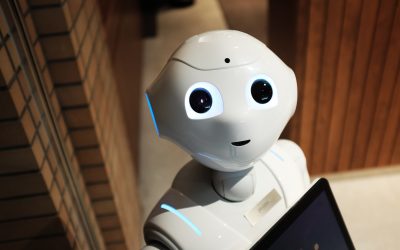In the 20th Century, automation took over many of the more repetitive and physically demanding business tasks, producing a “Thinking Economy,” in which humans are valued mostly based on their ability to think. This created a huge displacement in which physical workers (usually male), in such industries as farming and mining, were no longer valued as much by the society, and women achieved an unprecedented level of power and influence. In the 21st Century, another massive displacement is currently taking place, in which artificial intelligence (AI) assumes many of the thinking tasks, forcing human labor to focus more on feeling skills. This is the “Feeling Economy.” We anticipate that women will have the upper hand in the Feeling Economy, due to their naturally superior (on average) level of empathy.
The effects of AI’s proliferation on corporate reputation are increasingly profound. It affects how companies interact with customers, and how customers interact with each other. It also affects how corporate and brand reputation can be measured. Below we highlight some of the more intriguing ways in which AI will affect corporate reputation.
The Company-Customer Interface
Customer service personnel costs can add up, so companies are typically looking for ways to automate the customer service function. Routine customer functions can often be conducted online on corporate websites. This is the most primitive kind of AI. When somewhat more flexibility is required, the company can employ chatbots. Typically, the chatbot handles what it can, and then more difficult questions are escalated to a second level that is staffed by humans. The reputation of the company is strongly affected by the quality of the interaction.
Quite a few research questions immediately suggest themselves. For example, how do chatbots affect customers’ opinions of the company? How should AI split up the work with HI (human intelligence)? How can the firm maintain a positive relationship with its employees as it increasingly uses AI to do thinking tasks?
AI can also be used to build “adaptive personalization systems” that keep track of customer behavior over time, and continually improve the product to serve the individual customer better. Such AI uses individual customer data to improve the customer experience over time, resulting in better corporate reputation.
The Customer-Customer Interface
Social media have supercharged word-of-mouth, which is now much more important than ever before. Fortunately, companies now have AI tools that can measure and monitor this word-of-mouth to an unprecedented degree. By mining social media, companies can see whether the reputation of their brands are increasing or decreasing over time, and dimensions and sub-dimensions of brand reputation can also be tracked. An example of such tracker data is available on the Centre for Corporate Reputation website.
The Company-Society Interface
As AI advances, some human jobs are lost. For example, robots do much of the job in car factories that humans used to do by hand. However, putting people out of work is bad PR. Also, as AI assumes higher-level capabilities, it may be seen as an existential threat, as seen in movies such as “Terminator.” If AI becomes smarter than people in all respects, (what Ray Kurzweil terms “the singularity”) what need will it have for people? How can a firm use AI to increase its capabilities, without becoming a societal pariah?
The Company-AI Interface
When customers use Alexa to buy something, they are using AI as an agent. Increasingly, companies will have to realize that many of its customers are AI. In that circumstance, what the AI thinks about the company is just as important as what human customers think! In other words, a company can have a reputation to AI. Managing AI as a customer is not yet well-developed, but that will be how more and more business gets done.
Collaborating with AI
Within a company, tasks are divided between HI and AI. In such a case, it is likely that a typical customer will be encountering service provided by each. This can introduce complexity. For example, what happens when the AI part (typically more repetitive and/or thinking-oriented) is viewed positively, but the HI part (typically the more ambiguous and/or feeling-oriented) is viewed negatively? To what degree can one part “make up for” the deficiencies of the other part? Which is more important in driving reputation? How should AI and HI best team up to provide the optimal customer experience?
Discrimination from AI
It has been shown that AI can discriminate, even if it does not use discriminatory data for training. It has also been shown that such discrimination, even if profitable in the short-run, can be unprofitable in the long-run. Therefore, devising non-discriminatory AI algorithms is an emerging research priority.
Summary
Technology is the skeleton around which the muscles and flesh of business hang. Artificial intelligence is the most profound technological advance of the last 100 years, and is currently transforming the entire economy. How we cope with the emerging “Feeling Economy” will be the difference between life and death, for companies and societies alike.
Roland T Rust is a Distinguished University Professor at the University of Maryland and the David Bruce Smith Chair in Marketing at the Robert H. Smith School of Business, University of Maryland
Ming-Hui Huang is Distinguished Professor in the Department of Information Management at National Taiwan University



0 Comments